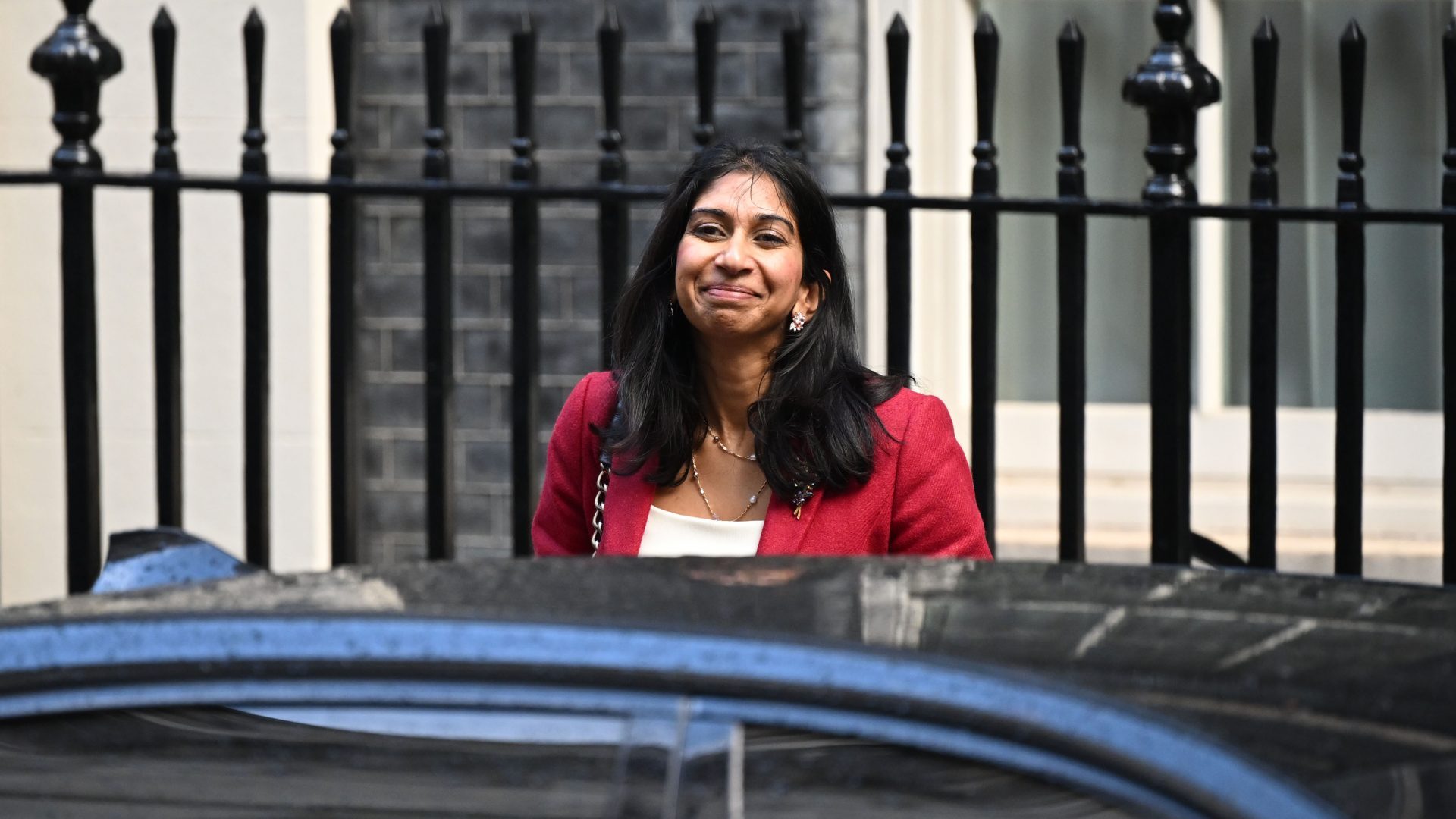Suella Braverman complains that she is the target of a witch-hunt over her highly questionable behaviour as home secretary. But the only witch hunt here is the one her inflammatory language and blatant untruths are likely to spark against asylum seekers coming to Britain.
And it will be embedded in long term government behaviour that not only exists in a moral vacuum but wilfully gets its facts wrong, both terrifying the public and demonising the newcomers.
As she struggled to defend herself against multiple allegations, from breaching the ministerial code by sending classified information to people not cleared to receive it, and doing so from her personal emails, to cramming asylum seekers into inhumane accommodation, Braverman has been hitting out at the people who’ve risked their lives to get here.
“The British people deserve to know which party is serious about stopping the invasion on our southern coast and which party is not. Let’s stop pretending they’re all refugees in distress,” the home secretary, who has been dubbed “Cruella” Braverman for her studied unkindness. It is her dream, after all, to decant planeloads of them into Rwanda, a country with a dubious human rights record.
The charity Care for Calais was among the numerous refugee NGOs to condemn her remarks. “This is incredibly offensive. Refugees are escaping from conflicts — they know what being invaded feels like. We are lucky that many of us do not,” said a spokesperson for Care for Calais. “To suggest they are committing an act of war when that is what they are fleeing is indefensible.”
“She’s putting lives at risk,” tweeted the Joint Council for the Welfare of Immigrants.
Unsurprisingly, Braverman’s effective incitement of hatred has been followed by anti-immigrant rhetoric from people fired up by years of immoral and misleading incitement by the Tory right, whether “Hostile Environment” Theresa May or “let’s push them back with a wave machine” Priti Patel.
One news report aired after Braverman’s comments featured a man who lived near the Manston “processing” centre in Kent, where the refugees have been kept amid overcrowding and disease. He was putting spikes on top of his garden wall. Social media was full of the usual suspects complaining about migrants “illegally” coming to the UK when they had come through “safe countries”, and should not be allowed in.
Before Braverman made her latest verbal attacks on asylum seekers, a man firebombed a migrant centre in Dover in a suicide attack. How long before these become more common after politicians set the newcomers up as targets?
Yet the conversation never leaves these murky depths. Yet again, Nigel Farage has been inexplicably interviewed on the BBC, even though he is known to be rabidly anti-immigrant and currently holds no political position that merits him being heard. He has for too long been allowed to spout provocative untruths, without challenge. Braverman’s predecessor, Patel, is also guilty of such intemperate talk, although even she is no match for Braverman, whose truth-twisting is increasingly dangerous.
What makes this so frustrating is that all the anti-migrant claims are easily refuted, even by Braverman’s own side. This week, Alicia Kearns, the new chair of the foreign affairs select committee, told the News Agents podcast that “I think about 85% of those who go through are getting refugee status,” indicating that the majority are indeed “refugees in distress”.
Roger Gale, the Conservative MP for North Thanet, the constituency where Manston is situated, has blamed the latest crisis on a “deliberate” decision by the government not to book hotel places for asylum seekers. This meant they were forced to stay in a centre designed only for swift, overnight processing. He did not trust Braverman, he told Times Radio. “Her language yesterday, I’m afraid, suggested that she is only really interested in playing the right wing.”
This makes the talk of “illegal” migrants and “illegal” routes, all the more reprehensible. Used to back up claims of an “invasion” of people who have no right to be here, these phrases, which are liberally used by pretty much everyone in discussions about Channel crossings, are not accurate.
According to the Refugee Convention, people are allowed to seek asylum wherever they like — their claims might be rejected, but they are allowed to ask. It is not illegal to be an asylum seeker, whatever the later judgement, and it is not illegal to travel to a place where you want to claim that status.
Another concept that is detached from reality — but parroted endlessly by politicians, the media and the public — is that they must stay in the first “safe country” they arrive in. This nonsense needs to be put to bed. There is no explicit or implicit obligation under the Refugee Convention for asylum seekers to stay in the first “safe” country. They often have reasons to go to the places they choose. Often they come to the UK, because they have relatives or friends here, or because they speak the language, which will make it easier for them to integrate.
The “safe country” narrative is linked to the European Union’s Dublin Agreement, which provided for migrants to be sent back to the first “safe” European country they reached. The UK can’t make use of this anyway because of Brexit, but it is also morally dubious under refugee conventions and highly impractical.
In any case, most people do stay in the first country they come to – that’s why countries in the Middle East, and on the borders of the EU, such as Greece and Turkey, are overwhelmed. According to Refugee Council data, 72% of refugees stay in countries next door to their own, and most of them are in the Middle East. Compared even to other European countries the UK takes a very small proportion of refugees – something that needs to be pointed out as often as possible.
Of the world’s 27.1 million refugees, the UK is home to 1%. Turkey, a country of 85 million, hosts nearly 4 million refugees. The UK, a much richer country of 67 million, had 140,000. The total number of annual asylum seekers is not at all-time highs. According to the government’s own data, there were more than 84,000 applicants in 2002. In the 12 months to June this year, there were 63,000.
As Madeleine Sumption, director of the Migration Observatory at the University of Oxford, told Radio 4’s Today programme, policymakers in France and Germany are probably looking at the UK immigration numbers and “wondering what the fuss is about… The UK experienced a period for most of the 2010s where there were actually very low numbers of asylum claims by historical standards.”
If the public understood this, instead of being told that the UK was uniquely under attack by hordes of dangerous foreigners, the perception of a “migrant crisis” might go away. And there might be fewer self-proclaimed activists and Twitter users, inflamed by Braverman’s rhetoric, trying to man the barricades.
As for “illegal” routes, asylum seekers can not always saunter onto a scheduled flight. Mostly they have to flee dangerous countries. Many come from Iran, Syria, Afghanistan and Iran, and must leave in a hurry, any way they can. Have people not seen the news about the violence, poverty and famine in Afghanistan since the hurried US and UK withdrawal which left behind many Afghans whose lives are in danger for helping the West?
People from these countries are almost never granted visas as a matter of course, even if they had the passport and the time to book their way out as if on holiday. We forget that this is a luxury for people in well-off nations. Most asylum seekers have to travel in unorthodox ways. They use organised criminal networks to leave war zones because that is pretty much the only option they have.
There are many reasons for the situation over which Braverman now presides. The people traffickers putting the asylum seekers on rickety boats and sending them across the Channel are guilty of illegal criminal activity and putting people’s lives in danger. But they are reacting to a growing demand, enabled by the behaviour of the Home Office.
Increasingly migrants come to seek asylum via flimsy Channel crossings because the UK has mostly shut off legal routes, leaving them with no option. Family reunion is very limited. Some other countries have humanitarian visas for which asylum seekers can apply. If it wanted to, the Home Office could have application and processing points in Istanbul and France. Their choices mean everyone has to pile into the UK even to ask the question – and they do this by sea because other irregular options by land have been barred.
Resettlement programmes set up by the government in conjunction with the UN could have provided another way of accepting refugees, but the process is painfully slow and they have been nationality and time-specific, and limited in number.
The way these programmes are run is at the heart of the other big problem in Braverman’s in-tray – accommodation. The whole way the UK has decided to deal with refugees, reluctantly, slowly, piecemeal, is the reason why the government has left itself the choice of expensive hotel accommodation or inhumane warehouses of misery like Manston.
When reporting on refugees last year, I spoke to Louise Calvey of Refugee Action, who highlighted this growing problem. Once a nationality stopped being flavour of the month, its programme would be closed and existing accommodation released back to the landlords. They found tenants elsewhere, meaning that when nationals from another country had their own scheme, the accommodation search had to start all over again. Prices were higher, homes were scarce. Each time the UK moved from Syrians to Afghans to Ukrainians as the preferred refugee nation, accommodation would be lost in the gaps because the system was seemingly run on the assumption that there would be no others.
“When (the Syrian programme) stopped, it turned that infrastructure off. We’re working to build a housing pipeline but there’s a massive backlog now,” she told me a full year ago, when thousands of Afghans were stuck in hotels. “It’s an eye watering cost. It’s incredibly wasteful from a taxpayer, business perspective, and a terrible environment to raise a family in.”
“It’s one of the worst ways for mobilising a response,” Calvey added. “Globally there is a pattern of ongoing conflict. So why not embed proper safe routes? They just need one comprehensive system that works, is scalable and doesn’t waste money that could be spent on refugees instead. It doesn’t even have to be a liberal system.”
Now, everything is being made worse by the mismanagement of applications. Yvette Cooper, shadow home secretary, has lambasted Braverman’s home office over the growing backlog of asylum cases. If their cases were swiftly dealt with, those who met the criteria could get on with their lives and those who did not could be asked to leave.
“Decision making has collapsed,” Cooper told parliament. “The home office took just 14,000 initial asylum decisions in the past 12 months compared to 28,000 six years ago. Ninety-six per cent of the small boat arrivals last year have still not had a decision, and initial decisions alone are taking more than 400 days under this Conservative government’s watch.”
Cooper said the nationality and borders bill and recent changes to immigration rules had made this worse. But the inefficient, shaky home office decision process has long been the target of criticism. In 2017, whistleblowers described a chaotic system where lucrative student visas were prioritised over other claims such as family reunion, and complex cases were being given to junior staff without enough experience and without enough time to call in documents and assess them correctly. Earlier this year, Amnesty International criticised Patel for her “disastrous” leadership, under which the backlog of asylum cases had quadrupled.
“The cost of this is astounding by any measure – the suffering of refugees abandoned in unsuitable accommodation, the unsafe journeys and profits of criminal gangs, or the cost to the taxpayer of sustaining rather than addressing all this,” said Steve Valdez-Symonds, Amnesty International UK’s Refugee and Migrant Rights Director, in August.
So, if you are one of those looking for a reason to be angry about migration numbers, do not target your ire at the tired, anxious asylum claimants washing up on the shores of Kent. Target the government and the way it runs the home office. This is squarely on them.











